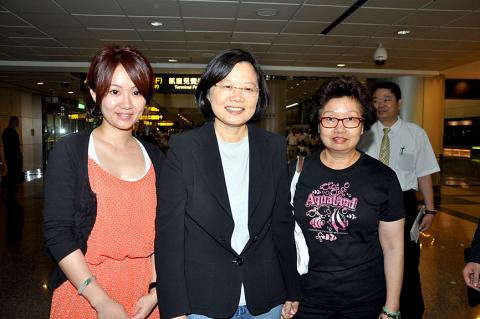Seeking to assuage apprehensions about the future of cross-strait relations, Democratic Progressive Party (DPP) Chairperson and presidential candidate Tsai Ing-wen (蔡英文) yesterday reaffirmed her party’s willingness to hold talks with Beijing.
Concluding a three-day visit to the Philippines, Tsai made the remarks during a breakfast meeting with reporters.
The DPP, she said, was willing to sit down with China to discuss proposals for building a “feasible and viable” interaction framework between the two sides, adding that the talks would not come at the expense of the DPP’s political values and principles.

Photo: CNA
Tsai said she “welcomes [Chinese] officials to visit the DPP’s headquarters or its think tank,” referring to the New Frontier Foundation, where recent talks with foreign experts have been held.
“The DPP’s door is wide open with regards to China. We hope that through more interaction we can increase our mutual knowledge of one another and lower to the minimum any risks of a misunderstanding,” she said.
Tsai said that if the DPP regained the presidency next year, its cross-strait policy would be more transparent and involve more input from the public.
The legislature would also be given a chance to monitor such agreements, she said.
A former Mainland Affairs Council chairperson, Tsai also defended the consistency of her China policies.
Critics have accused her of holding ideas that are less than pragmatic and seeking to isolate Taiwan from Beijing, despite a booming Chinese market. She has also been accused of being unclear on how the DPP would handle the Economic Cooperation Framework Agreement, a trade deal signed with China in June last year.
“I have always been very clear on how I handle cross-strait relations. Some people believe that I’m unclear only because they have purposely not closely studied my [policies],” Tsai said.
Tsai also addressed the dispute over the Spratly Islands (南沙群島) — the rich fishing grounds claimed in part by Taiwan, China, Brunei, Vietnam, the Philippines and Malaysia — during her morning discussion.
Taiwan, she said, needed to make clear its separateness with China, especially on sovereignty over the islands. She remained non-committal on whether Taiwan should work together with its cross-strait neighbor to resolve sovereignty disputes.
“Taiwan has its own motives on the Spratly Islands dispute — and the basis of that is Taiwanese sovereignty — separate from China,” she said.

Seventy percent of middle and elementary schools now conduct English classes entirely in English, the Ministry of Education said, as it encourages schools nationwide to adopt this practice Minister of Education (MOE) Cheng Ying-yao (鄭英耀) is scheduled to present a report on the government’s bilingual education policy to the Legislative Yuan’s Education and Culture Committee today. The report would outline strategies aimed at expanding access to education, reducing regional disparities and improving talent cultivation. Implementation of bilingual education policies has varied across local governments, occasionally drawing public criticism. For example, some schools have required teachers of non-English subjects to pass English proficiency

‘FORM OF PROTEST’: The German Institute Taipei said it was ‘shocked’ to see Nazi symbolism used in connection with political aims as it condemned the incident Sung Chien-liang (宋建樑), who led efforts to recall Democratic Progressive Party (DPP) Legislator Lee Kun-cheng (李坤城), was released on bail of NT$80,000 yesterday amid an outcry over a Nazi armband he wore to questioning the night before. Sung arrived at the New Taipei City District Prosecutors’ Office for questioning in a recall petition forgery case on Tuesday night wearing a red armband bearing a swastika, carrying a copy of Adolf Hitler’s Mein Kampf and giving a Nazi salute. Sung left the building at 1:15am without the armband and apparently covering the book with a coat. This is a serious international scandal and Chinese

TRADE: The premier pledged safeguards on ‘Made in Taiwan’ labeling, anti-dumping measures and stricter export controls to strengthen its position in trade talks Products labeled “made in Taiwan” must be genuinely made in Taiwan, Premier Cho Jung-tai (卓榮泰) said yesterday, vowing to enforce strict safeguards against “origin laundering” and initiate anti-dumping investigations to prevent China dumping its products in Taiwan. Cho made the remarks in a discussion session with representatives from industries in Kaohsiung. In response to the US government’s recent announcement of “reciprocal” tariffs on its trading partners, President William Lai (賴清德) and Cho last week began a series of consultations with industry leaders nationwide to gather feedback and address concerns. Taiwanese and US officials held a videoconference on Friday evening to discuss the

PERSONAL DATA: The implicated KMT members allegedly compiled their petitions by copying names from party lists without the consent of the people concerned Judicial authorities searched six locations yesterday and questioned six people, including one elderly Chinese Nationalist Party (KMT) member and five KMT Youth League associates, about alleged signature forgery and fraud relating to their recall efforts against two Democratic Progressive Party (DPP) legislators. After launching a probe into alleged signature forgery and related fraud in the KMT’s recall effort, prosecutors received a number of complaints, including about one petition that had 1,748 signatures of voters whose family members said they had already passed away, and also voters who said they did not approve the use of their name, Taipei Deputy Chief Prosecutor